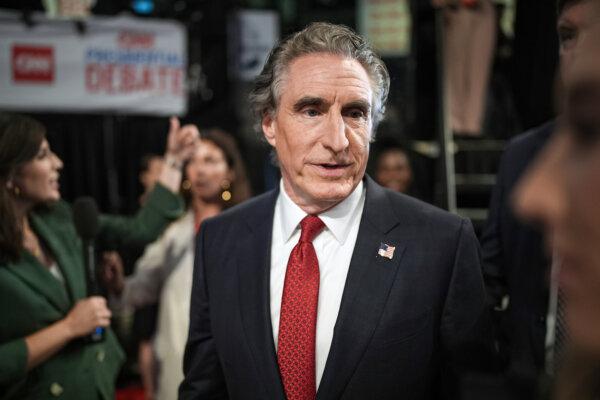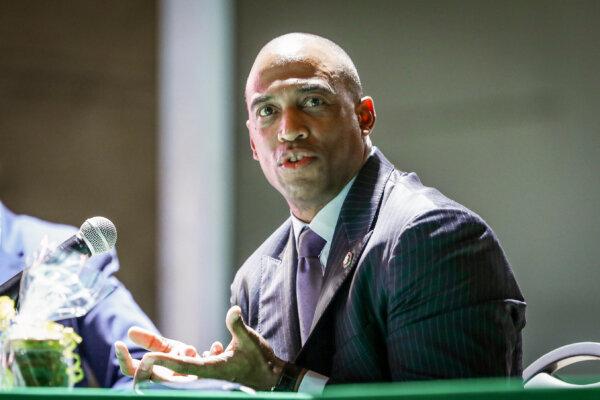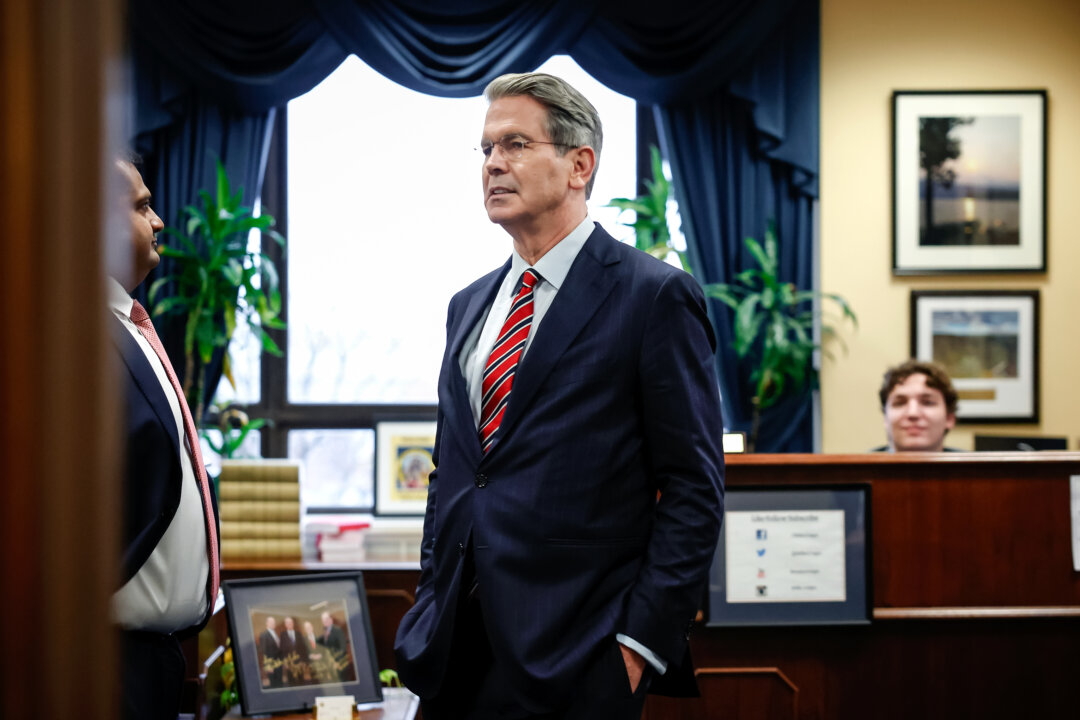Trump tariffs and energy policies will be at the center of Jan. 16 confirmation hearings.
The U.S. Senate will continue its slate of high-stakes hearings to consider President-elect Donald Trump’s Cabinet nominations days before his inauguration.
Billionaire financier Scott Bessent, whom Trump tapped to head the Treasury Department, will headline the Jan. 16 schedule and appear before the Senate Finance Committee.
Former North Dakota Gov. Doug Burgum, whose confirmation hearing for secretary of the Department of Interior was delayed over paperwork issues, will sit in front of the Senate Committee on Energy and Natural Resources.
Lee Zeldin, who has been nominated to lead the Environmental Protection Agency, will testify before the Senate Committee on Environment and Public Works.
The Senate Committee on Banking, Housing, and Urban Affairs will hold its nomination hearing for Scott Turner, Trump’s choice to head the Department of Housing and Urban Development.
The Trump Tariffs
Wall Street will pay close attention to Bessent’s comments on tariffs.
Bessent has expressed support for the president-elect’s trade pursuits. In a Fox News op-ed shortly after the November 2024 election, Bessent endorsed the tactic as a negotiating tool, revenue generator, and shield for U.S. industries.
The hedge fund manager has signaled over the past few months that Trump’s tariff policies could be watered down.
In a Nov. 6, 2024, interview with CNBC, Bessent said that tariffs should be “layered in gradually” to ensure that higher prices appear over time and are then offset by the incoming administration’s disinflationary efforts, such as cutting red tape.
In October 2024, he also told the Financial Times that Trump’s universal tariffs were “maximalist” stances that could be chipped away.
“My general view is that at the end of the day, he’s a free trader,” Bessent said. “It’s escalate to de-escalate.”
Trump has proposed across-the-board 10 percent to 20 percent levies on all imports and 60 percent to 100 percent tariffs on Chinese goods arriving in the United States. He has also threatened 25 percent tariffs on Canada and Mexico.
Media reports, including one from The Washington Post, suggested that Trump could scale back his tariffs. The president-elect recently denied these reports on his Truth Social social media platform.
“The story in the Washington Post, quoting so-called anonymous sources, which don’t exist, incorrectly states that my tariff policy will be pared back. That is wrong. The Washington Post knows it’s wrong. It’s just another example of Fake News,” Trump posted.
The 3-3-3 Strategy
Lawmakers will likely explore the Key Square Group founder’s “three arrows” growth strategy, also known as his 3-3-3 initiative.
Last summer, speaking at a Manhattan Institute event, Bessent recommended three different economic strategies that the Trump administration could use to stimulate the national economy and improve the federal government’s finances.
This would involve aiming for 3 percent real economic growth, boosting domestic crude oil production by 3 million more barrels per day, and reducing the budget deficit to 3 percent of GDP by the end of Trump’s second term.
“How do you get that?” Bessent asked during the conference. “Through deregulation, more U.S. energy production, slaying inflation, and forward guidance on competence for people to make investments so that the private sector can take over from this bloated government spending.”
Sen. Elizabeth Warren (D-Mass.) authored a 31-page letter to Bessent on Jan. 12, featuring dozens of questions. In it, she requested further information on his economic strategy and positions on other issues and urged him to be prepared to answer her questions at the confirmation hearing.
When examining Bessent’s 3-3-3 proposal, Warren asked why the first Trump administration’s tax cuts and deregulatory efforts failed to spur 3 percent growth.
“There is no comprehensive record of your positions relating to various Treasury-related duties and key policy areas within the Secretary’s orbit,” Warren wrote.
“The Treasury Secretary must safeguard our financial system, ensure the fairness of our tax system, and expand economic opportunities for the middle class, not just help rich investors make more money.”
A ‘Shadow Fed Chair’
While Bessent dismissed this idea, senators could learn more about his proposal to select a “shadow Fed Chair.”
In October 2024, Bessent recommended that Federal Reserve Chairman Jerome Powell’s successor be chosen before his second term ends in 2026.
“You could do the earliest Fed nomination and create a shadow Fed chair,” Bessent told Barron’s. “And based on the concept of forward guidance, no one is really going to care what Powell has to say anymore.”
After a meeting with Senate Finance Committee Chairman Mike Crapo (R-Idaho) last month, Bessent walked back the comments.
“As the president said on Sunday, and I’m in complete agreement with him, that Jay Powell will serve out his term,” Bessent told CNBC.
Trump has repeatedly stated that Powell can serve the remainder of his term. The central bank chief has also confirmed that he would not step down if asked to, and said his termination would “not be permitted under the law.”
The president-elect and Powell have had a strained relationship since Trump’s first term. However, the Fed chairman has stated that he expects to maintain a cordial working partnership with the incoming administration.
A Look at the National Energy Council
As he assembled his energy-focused administration, Trump announced in November 2024 that he will create a National Energy Council chaired by Burgum, who is nominated as secretary of the Department of Interior.
Lawmakers will likely try to garner more significant insights into Burgum’s new role and the council’s agenda.

Burgum, who will also have a seat on the National Security Council, will spearhead a whole-of-government panel expected to partner with all agencies and departments that work with regulations, permits, oil and gas production, and transportation.
The former North Dakota governor stated that the White House council would foster coordination within the federal government to advance domestic energy and assert U.S. energy dominance.
The president-elect and his team have signaled that the incoming administration will take an all-of-the-above approach to energy, from fossil fuels to renewables.
During his two terms as governor, Burgum championed his state’s oil and gas industry and supported renewable energy solutions, such as wind power.
‘Drill, Baby, Drill’
Under Trump, Burgum could push to auction more federal lands for future oil and gas development.
The Department of the Interior could play a substantial role in realizing Trump’s energy plans as it oversees energy development and other activities on about 500 million acres of public land.
Trump wants to embark upon a deregulatory crusade, and permits will be one area to transform.
As interior secretary and energy czar, Burgum could lead an accelerated permitting and regulatory process that would help expand oil and gas drilling and production.
On the 2024 campaign trail and since his electoral victory, Trump has repeatedly promised to embrace the “frack, frack, frack” and “drill, baby, drill” mantras for his second term’s energy policy.
The potential blueprint will ignite probing by Democrat lawmakers in the upper chamber. Officials could concentrate on energy development in environmentally sensitive regions such as Alaska’s wildlife refuge or areas bordering the Grand Canyon.
Concerning emissions and threatening the country’s climate commitments, Burgum has a record of endorsing the concept of carbon capture, which he called a “game-changer” for the world. The idea involves capturing emissions before they reach the atmosphere.
In December 2023, Burgum applauded the Energy Department’s $350 million grant to Minnkota Power Cooperative for its proposed carbon capture project.
Senators May Ask Turner About Housing Crisis
The hearing for Scott Turner, Trump’s pick to head the Department of Housing and Urban Development, will take place at 10 a.m. ET on Jan. 16 before the Senate Committee on Banking, Housing, and Urban Affairs.
Turner is a former National Football League cornerback who led the White House Opportunity and Revitalization Council during Trump’s first term.
He will likely be asked questions about how he will address the U.S. housing crisis, including from committee ranking member Elizabeth Warren.
“Are you committed to using the tools of the federal government to increase the supply of affordable housing as HUD Secretary?” Warren asked Turner in a Jan. 12 letter outlining her chief questions for him.
According to Pew Research, the percentage of Americans who describe themselves as “very concerned” about housing costs increased from 61 percent in 2023 to 69 percent in 2024.

Thirty-year fixed mortgage rates have increased markedly since 2020. Yet today’s nearly 7 percent average is still well below the highs of above 16 percent in the early 1980s.
Over the past four decades, homes have become significantly more expensive relative to what Americans earn. The ratio of housing prices to income rose from 3.5 to 5.8 during that period, according to an analysis of Federal Reserve data from Visual Capitalist.
Turner has secured endorsements from U.S. Mortgage Insurers and other housing industry groups.
Zeldin Could Face Scrutiny Over Paid Op-Eds
Prospective Environmental Protection Agency Administrator Lee Zeldin will testify to lawmakers on Jan. 16. He will do so before the Senate Committee on Environment and Public Works at 10 a.m. ET.
The former New York congressman, who lost a 2022 gubernatorial race against current New York Gov. Kathy Hochul, will likely face questions about climate change and the safety of fossil fuels, similar to those posed to Trump’s energy secretary nominee, Chris Wright, during his Jan. 15 hearing.
In addition, the nominee’s paid op-eds will almost certainly draw attention.
Zeldin’s financial disclosure revealed that he wrote opinion articles on behalf of CRC Advisors, Point Made PR, and other clients for the New York Post, Fox News, and Real Clear Policy. One such op-ed, published in Real Clear Policy, netted Zeldin $25,000. That article did not make it clear that CGCN Group, a lobbying firm with ties to the oil and gas industry, was paying the author.

